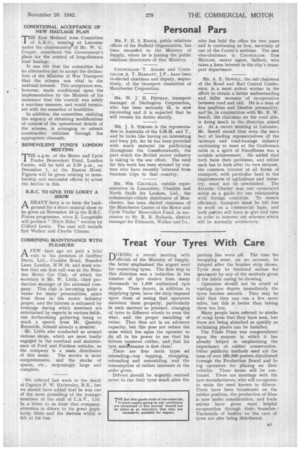Personal Pars
Page 27

If you've noticed an error in this article please click here to report it so we can fix it.
MR. F. H. S. RASCIL public relations officer of the Nuffield Organization, has been seconded to the Ministry of Supply, where he is joining the public relations directorate of that Ministry.
COUNCILLOR ' T. ADAMS and COUNCILLOR A. T. BARRATT, J.P., have been re-elected chairman and deputy, respectively, of the transport committee of Manchester Corporation.
MR. W. J. H. PENMAN, transport manager of Darlington Corporation, who has been seriously ill, is now recovering and it is expected that he will resume his duties shortly.
MR. J. S. STRONG is the representative in Australia of the S.M.M. and T., and he looks like having an interesting and busy job, for he has been provided with much material for publicizing throughout the Comrhonwealth, the part which the British motor industry is taking in the war effort. The need for this work has been stressed by visitors who have recently 'returned from business trips to that country.
MR. WM. COLVELLE, outside representative in Lancashire. Cheshire and North Staffs for Lookers, Ltd., the commercial-vehicle distributor of Manchester, has been elected chairman of the Manchester Centre of the Motor and Cycle Trades' Benevolent Fund, in succession to Mr. R. B. Rylands, district manager for Edmunds, Walker and Co., who has held the office for two years and is continuing as hon. secretary of one of the Centre's sections. The new vice-chairman is COUNCILLOR Tom MELLOR, motor agent, Salford, who takes a keen interest in the city's transport department.
MR. A. E. SE WELL, the rail chairman of the Road and Rail Central Conference, is a most ardent worker in the effort to obtain a better understanding and fuller measure of co-operation between road and rail. He is a man of fine qualities and likeable personality, and he, in conjunction with Mr. R. W. Sewill, the chairman on the road side, is doing much in the direction aimed at. At a recent .meeting at Leicester, Mr. Sewell stated that even the mere fact of leading representatives of the railways and road-haulage industry continuing to meet at the Conference table in a spirit of friendliness was a notable achievement. He added that both have their problems, and whilst each has to look after its own interest, the common interest of all forms of transport, with particular heed to the requirements of agriculture and industry, 'must not be overlooked. The Atlantic Charter was not enunciated solely as a guide for our relationship with foreign countries. To ensure efficiency, transport must be left free to work on a commercial basis, and both parties will have to give and take in order to hammer out schemes which will be mutually satisfactory.




























































